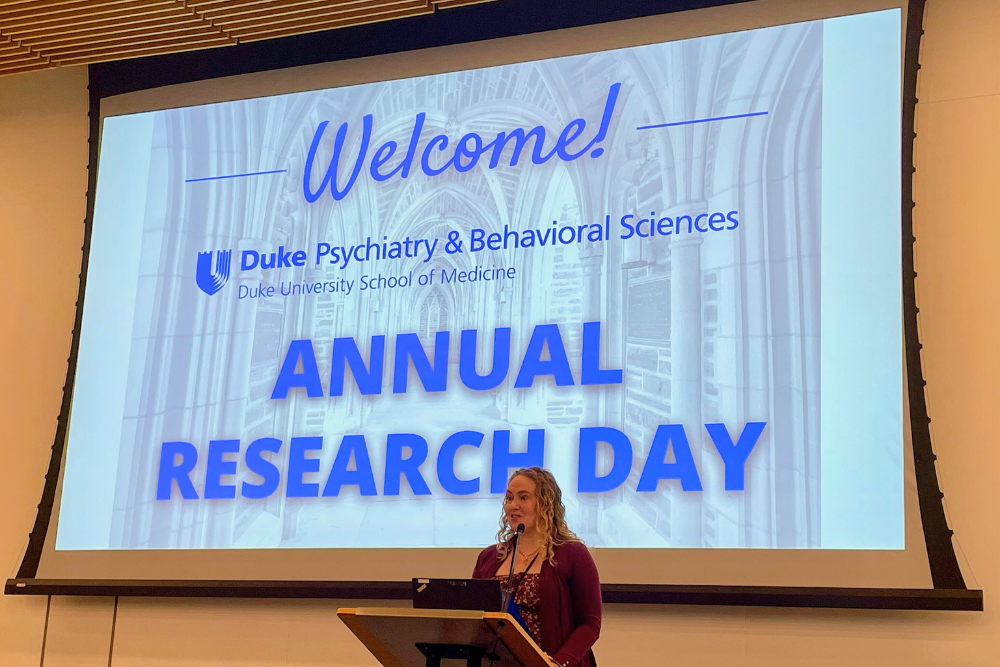Check out our news archive below to learn more about what’s happening in Duke Psychiatry & Behavioral Sciences!
2025 Duke Psychiatry Awards & Honors Roundup
Dozens of Duke Psychiatry & Behavioral Sciences faculty members and trainees received noteworthy awards and honors, published books, or took on new leadership roles in 2025:
Angel Peterchev Elevated to IEEE Fellow
Angel Peterchev, PhD, professor in psychiatry and behavioral sciences, was selected as an Institute of Electrical and Electronics Engineers (IEEE) Fellow effective January 1, 2026. He was honored for his contributions to device development and modeling for electromagnetic brain stimulation.
Interactive Approach Transforms Psychiatry Education for Medical Students
In collaboration with the directors of the School of Medicine's first-year curriculum for medical students, Rebekah Jakel, MD, PhD, transformed the psychiatry curriculum earlier this year from a traditional lecture-based format to an interactive case study approach. It’s been a refreshing change for students and the faculty who teach them.
Spotlight: Alexandra Bey, MD, PhD, Serves Families Through Research and Patient Care
Alexandra Bey, MD, PhD, is a child psychiatrist in the Duke Autism Clinic and a researcher in the Duke Center for Autism and Brain Development. Dr. Bey’s research and clinical career is dedicated to improving the lives of those with neurodevelopmental disorders. Communications strategist Evan Watson sat down with Dr. Bey for a conversation about her career and research goals, and how her dual roles in research and patient care overlap.
Jonathan Posner Named Executive Vice Chair
Jonathan Posner, MD, has been promoted to a new role—executive vice chair in the Department of Psychiatry & Behavioral Sciences—effective December 1. He will also continue serving in the role of vice chair for research for the department.
Beat Holiday Stress with Strategies to Protect Your Peace
The holidays can be both merry and heavy. Between gatherings, shopping and expectations, it’s easy to feel overwhelmed. Duke wellness professionals including clinical psychologist Ilana Pilato, PhD, share tips to protect your peace and care for your mind, body and spirit this season.
Beyond the Prescription: Elevating Patient Conversations about Nutrition & Food Insecurity
Internal medicine-psychiatry resident Lynette Staplefoote-Boynton, MD, MPH, is on a mission to better equip primary care and psychiatry trainees at Duke and beyond to counsel their patients on nutrition and food insecurity. This goal inspired her to develop a curriculum on the topic with the mentorship of Jane Gagliardi, MD, MHS.
A New Standard for Support: Duke and the Menges Family Redefine Cancer Care
Despite his yearslong battle with cancer, Duke University student Bobby Menges was always thinking about helping others. That sentiment inspired his parents to create the I’m Not Done Yet Foundation in his memory. The foundation surpassed $1 million in gifts to Duke Health in 2025 and has transformed how the Duke Cancer Institute supports young people with cancer. It helps support the work of Duke Psychiatry’s Caroline Dorfman, PhD.
A Day of Discovery: From Aging to AI and Much More
On October 30, more than 100 faculty, staff, and trainees from Duke Psychiatry & Behavioral Sciences gathered for a dynamic research retreat, hosted by the department’s clinical research unit at Duke University's Penn Pavilion.
Health Psychologists Build Community & Skills through Monthly Series
The clinical health psychology symposium aims to build community and connection while providing learning opportunities specific to the unique challenges of providing psychological services in medical and surgical settings. The virtual monthly series was founded by Duke Psychiatry's Katherine Applegate, PhD.









